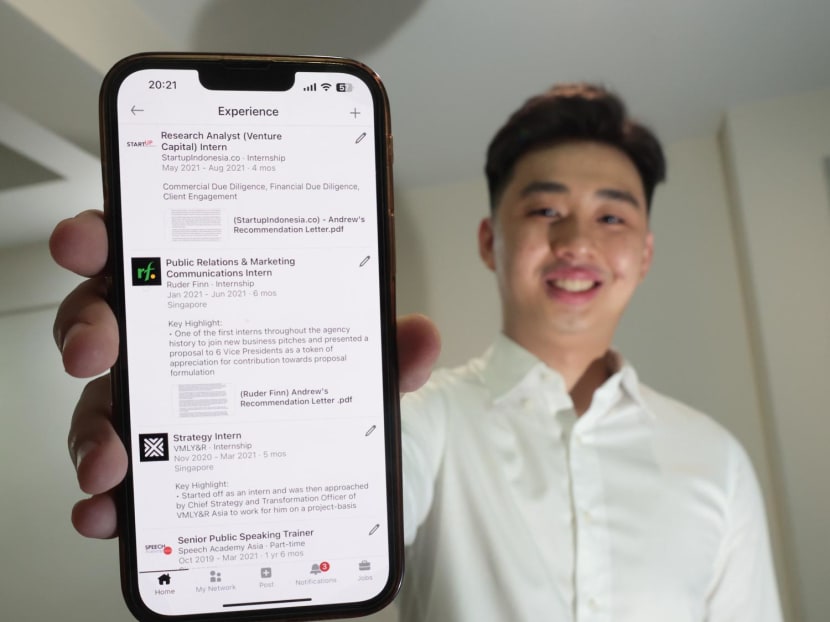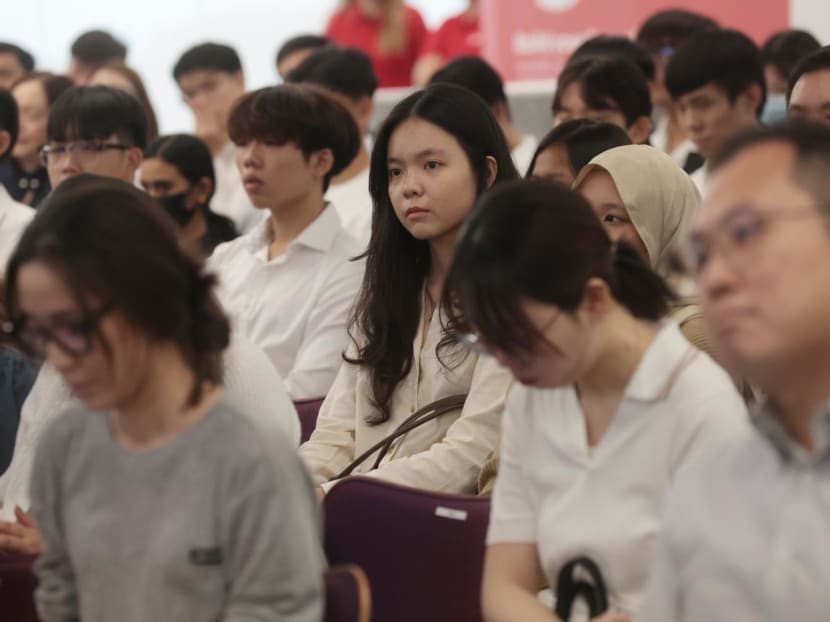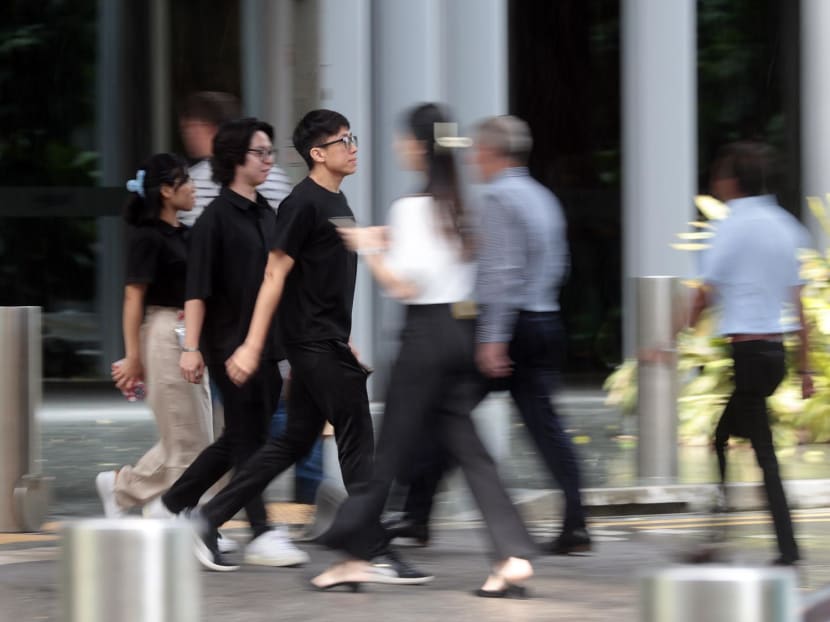The Big Read in short: The pitfalls of internship stacking
SINGAPORE — For the last two years of his university studies, Mr Andrew William strategically scheduled his timetable to maximise most of his time outside class taking up internship stints.

While educational institutes have long emphasised the importance of and helped students secure internships, students are growing increasingly hungry for more internship opportunities outside of school requirements.

This audio is AI-generated.
Each week, TODAY’s long-running Big Read series delves into the trends and issues that matter. This week, we look why Singapore students are in hot pursuit of internships and some implications of such a rat race. This is a shortened version of the full feature, which can be found here.
- Tertiary students are increasingly hungry for more internship opportunities outside of school requirements
- They believe this will increase their chances of snagging their ideal job upon graduation
- Some take on as many as 10 internships during their studies or even juggle two concurrent ones
- These students also go to great lengths to secure such work stints amid fierce competition
- However, the hot pursuit of internships can take a mental toll on students, among other pitfalls
SINGAPORE — For the last two years of his university studies, Mr Andrew William strategically scheduled his timetable to maximise most of his time outside class taking up internship stints.
The now-23-year-old would pack his classes into two to three days, allowing him to work for the rest of the week. Weekends were spent in front of his computer, as he toiled for several startups and consultancy companies.
In some semesters, he would take on two internships at once while juggling his communication studies at Nanyang Technological University.
In total, the Singapore permanent resident completed 10 internships before graduating in 2022 — although only one stint was a graduation requirement.
The rest of the internship stints? Mr William had taken them up on his own initiative.
To get these internships, Mr William joined his school's consultancy club — which provided networking opportunities. He also took part in case competitions to boost his portfolio.
While arming himself with 10 internships might seem like overkill to an earlier generation of undergraduates, Mr William — now works as a management consultant at an American consultancy firm — is part of a growing number of students who have joined the “rat race” for internships even before completing their paper chase at universities and polytechnics.
Those who spoke to TODAY said they had taken on at least three internship stints for several reasons: Getting more real-world learning experiences, earning pocket money and hoping to increase their chances of securing a better job after graduation.

WHY IT MATTERS
Getting an internship in well-known companies is no walk in the park, be it for students here or overseas, where the pursuit of multiple internships is also common.
CNN reported in 2019 that tech giant Google received 125,000 applications for its internship programme that year in the United States. At investment banking firm Goldman Sachs, 236,000 students applied for its internships in 2022 globally — of which reportedly 1.5 per cent were given a role.
An internship opportunity with Formula One motor-racing team Red Bull also drew “thousands” of Singapore-based applicants earlier this year, of which just two students snagged the internship.
The competition for internships has even spurred international businesses to tout their ability to help students secure coveted opportunities in the investment banking and consulting industries for a fee.
One such business based in Hong Kong, called IBankCoaching, states on its website that it provides job tracking support for internships and “insider tips” to ace interviews with companies such as Goldman Sachs, Blackrock and DBS.
The company claims that it can help students “to get into investment banking in London, Singapore and Hong Kong”, but did not state how much its services cost.
Taking on multiple internships at a time seems to be par for course, but some youths told TODAY that it comes at a price: Less “me-time” and a toll on their mental well-being.
Taking on internships outside of a school curriculum also puts students at risk of taking on stints that proved to be bad experiences, where they were either overworked or asked to do menial tasks such as picking up coffee orders.
While most educational institutions pair students with a mentor or career coach throughout their mandatory internship who can help manage company expectations, youths may not have access to such resources when taking on their own internships.
“I just dealt with it as there wasn't much I could do but suck it up,” Ms Vera Lim, a 22-year-old National University of Singapore (NUS) business administration student, told TODAY of her experience.
Among other things, she worked more days and hours than agreed upon and had to complete some work even while on medical leave.
"It was extremely stressful but I learnt how to set proper boundaries following the incident."
The competition for internships also raises questions about whether it is a level playing field for students who do not have a network in a particular industry.
NUS sociologist Tan Ern Ser noted that students who have larger social networks would have better access to opportunities and the relevant information — and hence a higher probability of landing internships.
“In short, connections matter, even in a meritocracy,” said Associate Professor Tan.
Because of this, lacking connections could translate into internship inequalities — and this would also apply to job opportunities too.
THE BIG PICTURE
Most institutes of higher learning require students to go through an internship as part of their graduation requirements, pointing to the benefits in establishing professional connections and gaining real-world experience.
They are seeing more students take up internships beyond the school's requirements — Singapore Management University (SMU), for one, said its students take on an average of 2.6 internships during their studies.
To take on these additional internship programmes on their own accord, students go to the extent of attending multiple networking sessions and several rounds of interviews with the companies they are eyeing.
Take for example third-year SMU student Koh Liang Jun, 24, who participated in a case competition for the chance to intern at global professional services firm Accenture — which he described as the most “tedious” way to get an internship.
In a case competition, students are given a business case study to solve within a set time in teams. Typical prizes include cash and a possible internship opportunity.
“Companies are finding different methods to get talents… such as through case competition where people can showcase their knowledge,” said Mr Koh, who is currently on his fourth internship stint, as an automation intern at a bank.
But why are they doing it? Students told TODAY it is not just for the working experience or the allowance — it is also to increase their odds at securing their ideal job.

Second-year NUS business administration student Ryan Ong added that peer influence also plays a role in his decision to take on four internships, with a fifth planned in New York at the end of the year.
“There’s a lot of pressure to take on internships because I see people around me taking on multiple internships. Some are even doing it part- time, building and using connections to get these opportunities,” he said.
Pay was not a key factor for the students who spoke to TODAY. They were paid between S$800 and S$1,500 per month. Only one took up an unpaid internship.
THE BOTTOM LINE
Mr Felix Tan, founder and chief executive officer of skills-based hiring platform Skilio told TODAY that many companies are moving away from hiring just based on academic grades.
With this, internships are not just valuable in helping youths stand out from other candidates when vying for a job — it has become a necessity.
“Amid today's job market uncertainty, it is also good advice to ensure valuable use of all your time. In this sense many internships can be value adding and help pave the way into full-time employment,” added Mr Rob Wisdom, director and head of supply chain of recruitment firm Ethos Beathchapman.
While this new form of rat race may be unavoidable for students these days, human resource experts warned that there is such a thing as too many internships.
Mr Kenji Naito, group chief executive officer of recruitment agency Reeracoen, said that students should “focus on internships that offer meaningful work, learning opportunities, and professional growth rather than simply accumulating numbers”.
This is because when a company is hiring a candidate, it looks at what they had done during their internships and how they had performed.
So what are the attributes of a good, quality internship?
First, it should be structured with clear objectives and learning outcomes, said Mr Naito.
There should also be access to mentors who provide guidance and feedback, as well as assignments that challenge and develop the intern’s skill sets.
“Companies should also offer feedback through regular performance reviews to help interns grow… and provide exposure to different aspects of the business,” he added.

Mr Wisdom said that it is important for interns to identify some of the things they want from their internship programme.
“For example, do you know if your personality suits a corporate or small company environment? Or, often had an itch for a certain role but not sure? Scratch it with an internship,” he said.
“Employees are undeniably far more successful, happy and value adding in roles and environments that fit them well.”
Company reviews and testimonials from former interns may also help students to decide if a particular internship is suitable for them.
Looking back, Ms Lim, who has taken on seven internships over the past three years, said she might have taken a different approach when applying for internships if given a second chance.
“At the beginning, I was ‘job hopping’ to find my place and interest,” she said, pointing to the array of internships she had done. These included working for a venture capital, organising events and trying her hand out as a marketing intern.
“There are much more targeted approaches to taking internships, such as focusing on building up your skills for a particular industry, before taking on internships only within this industry.”
Still, she described her internships as “maximising” her potential.
“In the end, I’m just trying to do everything to the best of my ability. And through these internships, I can at least be confident that my job in the future fits me, fulfills me financially and has room for me to grow,” said Ms Lim.










